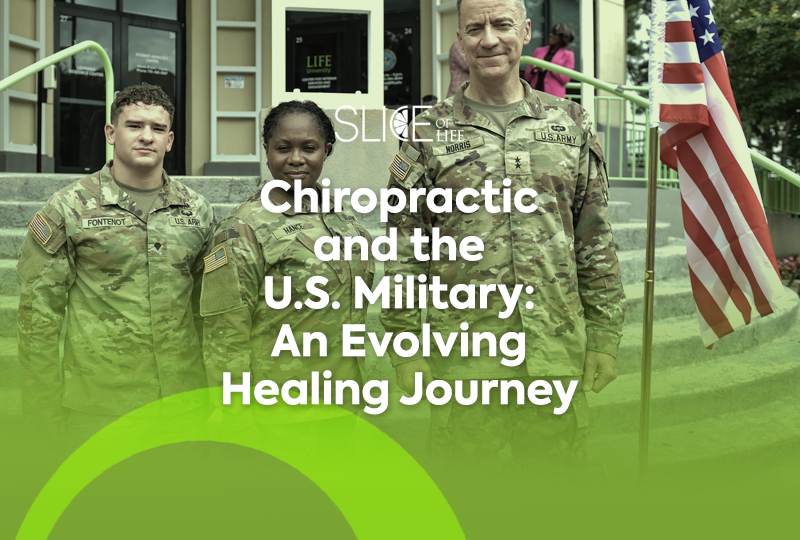Chiropractic as a profession has had to fight for recognized legitimacy and inclusion into the larger healthcare system since D.D. Palmer performed the first adjustment in 1895. Luckily for the evolution of holistic health, the chiropractic profession has progressed in the general lexicon leaps and bounds since then. One of the most profound and public examples of chiropractic’s acceptance has been the profession’s long-standing partnership with the U.S. Military. The academic article “Chiropractic in the United States Military Health System: A 25th-Anniversary Celebration of the Early Years” published in the Journal of Chiropractic Humanities in December 2020 spotlights key early moments of Chiropractic’s influence in the United States Military Health System (MHS).
Positive changes rarely come swiftly or at a desired pace. Legislative education and lobbying were required to make noise about Chiropractic to show why it mattered to be included in the healthcare plan for military personnel. The Department of Defense Authorization Act of 1985 detailed Congress’ directive to the Secretary of Defense to conduct a study on the cost and benefits of Chiropractic. A following law in 1993 also gave the U.S. military the ability to appoint chiropractors as commissioned officers. The early 1990s in general were a gloriously celebratory time for chiropractors as the waves of cultural changes were finally making way for reduced barriers for chiropractors to work collaboratively with traditional medical healthcare teams. This even included legal decisions that protected the rights of medical doctors to work with chiropractors as appropriate.
The first official integration of chiropractic care in the MHS occurred in 1995 under a three-year study of Chiropractic’s practical incorporation known as the Chiropractic Health Care Demonstration Project. It included 20 initial chiropractors at 10 military bases. The project ended up being extended by two years, adding on three extra bases. At its 1999 close, Congress opened the floodgates by approving development of permanent chiropractic bases and benefits for uniformed service members.
The modern landscape of Chiropractic offered for active serviceman and veterans is encouraging. The Journal of Chiropractic Humanities’ 2021 article, “An Essential Guide to Chiropractic in the United States Military Health System and Veterans Health Administration”, paints a patriotic picture of chiropractors serving the troops all across the MHS and subsequently the Veterans Health Administration. As it stood at that time in 2021, there were 60 chiropractic facilities employing 100 chiropractors that provided chiropractic care on base. That represents an estimated 350,000 annual chiropractic visits and a ratio of 1 chiropractor for every 14,000 service members. The prime directive of course is to allow service members to remain fit for duty as well as facilitating lasting health. Chiropractic care aims to give the option of injury and pain management without use of potentially addictive medication.
The outgrowth of Chiropractic within the Veterans Health Administration is similarly optimistic, with 190 chiropractic facilities and 300 chiropractors recorded in 2021. They reported 300-plus chiropractic visits annually at a ratio of 1 chiropractor per 30,000 veterans. Ideally for both active and veteran populations, finding a way to improve the ratio of chiropractors available to better meet the complex needs of our military personnel would prove even more effective to manage chronic musculoskeletal conditions and promote drug-free pain management. It’s a classic case of a win-win for both the chiropractic profession and the military populations that we proudly serve, as they have so graciously served us.
Life University’s Renewed Commitment to Military and Veteran Students with New Center for Veteran Services and Engagement
In keeping with the spirit of cooperation and support of Military and Veterans, Life University (Life U) recently opened its new Center for Veteran Services and Engagement on July 25, 2024. The Center aims to enhance military and veteran students’ educational and career success. Ms. Collins brings a wealth of knowledge and dedication to this pivotal role, ensuring that military and veteran learners receive the support they need to thrive.
The Center focuses on several key areas to ensure the success of veteran students:
- Targeted Resources: Offering specialized programs and services to assist military and veteran students in reaching their educational and career goals.
- Community Building: Facilitating peer connections and networking events to create a strong sense of community among veterans on campus.
- Collaborative Partnerships: Working with various university departments to provide holistic support for military and veteran students.
- Recognition and Growth: Valuing the diverse perspectives of veterans and fostering a culture of learning and growth within the university community.
The Center for Veteran Services and Engagement represents a significant advancement in Life U’s mission to empower each student to maximize their potential within. By providing tailored resources and fostering community, the Center aims to enhance the overall experience and success of military and veteran students at Life U.
For more information about Life University, visit life.edu.


Social Media